Meta Description: Looking to work with ambassadors for your brand? Learn everything you need to know about what is ambassador marketing and how to make it work.
Ambassador marketing is the practice of promoting your business and its products or services through loyal customers and true brand advocates. Also known as brand ambassadors, these individuals help to authentically promote your brand as they genuinely love your brand. So they play an instrumental role in earning the trust of your target audience and convincing them to buy from you.
This guide explores ambassador marketing and how you can leverage it for your brand. It also explains who a brand ambassador is, where you can find them, and how you can build your own ambassador program. Let’s take a look.
FREE DOWNLOAD: How to Create a Successful Brand Ambassador Program
- Who is a Brand Ambassador?
- Why Use Ambassador Marketing?
- Where Can You Find Possible Brand Ambassadors?
- What Are Some Brand Ambassador Strategies to Consider?
- What Are the Different Types of Brand Ambassador Programs?
- What Are the Steps to Build a Brand Ambassador Strategy?
- Make Ambassador Marketing Work for You
- Frequently Asked Questions
Who is a Brand Ambassador?
A brand ambassador is someone you’ve formally engaged to represent your brand in a positive light. In exchange, they may receive benefits such as free products, exclusive invites, modeling opportunities, and early access to new collections. This is done with the intention of raising brand awareness and boosting brand perception while ultimately driving more sales.
Since ambassadors are representatives of your brand, they need to have a persona and image that aligns with your brand’s identity. That way, you can get people to associate your brand with that specific persona or image, helping to create your intended brand perception. For instance, Hot Topic works with brand ambassadors who can accurately represent the brand’s edgy and alternative persona.
Brand ambassadors should have a solid understanding of your brand and its products or services to promote it effectively. They may use various methods to share information about your brand, such as word of mouth, face-to-face interactions, email, social media, blog posts, and messaging. It’s also common to see brands featuring their ambassadors in their marketing materials, promotional campaigns, events, and social media content.
The term “brand ambassador” can encompass anyone from influencers and celebrities to everyday consumers and employees but is mainly used to define anyone you’ve appointed to advocate for your brand. In general, however, you can break down brand ambassadors into two types:
- Influencers– Selected because they are thought leaders online in the field that the brand operates. They have little brand buy-in, but will usually promote the brand's product for money, the brand's product, or services
- True fans – People who have already shown brand loyalty. They will often be either customers or employees. They don't have the social following of real influencers, but they are likely to be powerful advocates for the brand. They are often happy to act as brand ambassadors for free, although they will appreciate free product.
We tend to look at the real fans of a brand when we refer to "ambassador marketing," leaving the influencers to participate in “influencer marketing."
Why Use Ambassador Marketing?
Ambassador marketing works because you have real people who are enthusiastic about your brand and its products or services. This is particularly true if you’ve activated ambassadors who have always advocated for your brand. People know those ambassadors genuinely love your brand, making them more likely to trust their recommendations.
In fact, seeing a product in user-generated content makes people more likely to buy it than seeing it on a brand’s social media. 50% of consumers said they’d be more likely to buy a product after seeing images from customers who have previously bought it.

Moreover, brand ambassadors may not necessarily need monetary compensation. In exchange for their advocacy, you may provide them with non-monetary benefits such as free products, event invites, exclusive access, and modeling opportunities. So, there’s minimal investment involved, making ambassador marketing an affordable way to promote your business.
Where Can You Find Possible Brand Ambassadors?
One of the most effective places to find potential brand ambassadors is your own social media. People who already love your brand are likely to create content about your brand. These would make for authentic partnerships as you’re allowing true fans to represent your brand. See who’s already tagging you and mentioning your brand in their posts.
Social media monitoring tools can help you simplify the process by identifying relevant conversations about your brand. You can go through positive brand mentions to find people leading those conversations and turn them into brand ambassadors. Social media platforms like Facebook even have a useful “Top Fan” badge feature highlighting people most engaged with your brand’s content. This is a great way to narrow down customers who would make excellent ambassadors.
There are also dedicated brand ambassador management platforms that will help you with the discovery aspect of your ambassador marketing. For instance, Creator.co will let you create a campaign brief and have creators apply to be a part of the campaign. This makes it easy to build a list of ambassadors who are enthusiastic about working with your brand.
Another option is to set up an ambassador application page on your website. So people who are interested in being your brand ambassadors can apply directly. Some brands have limited openings so they notify their subscribers and invite them to be a part of the program. For instance, Glow Recipe periodically notifies customers to be a part of the Official Glow Gang.
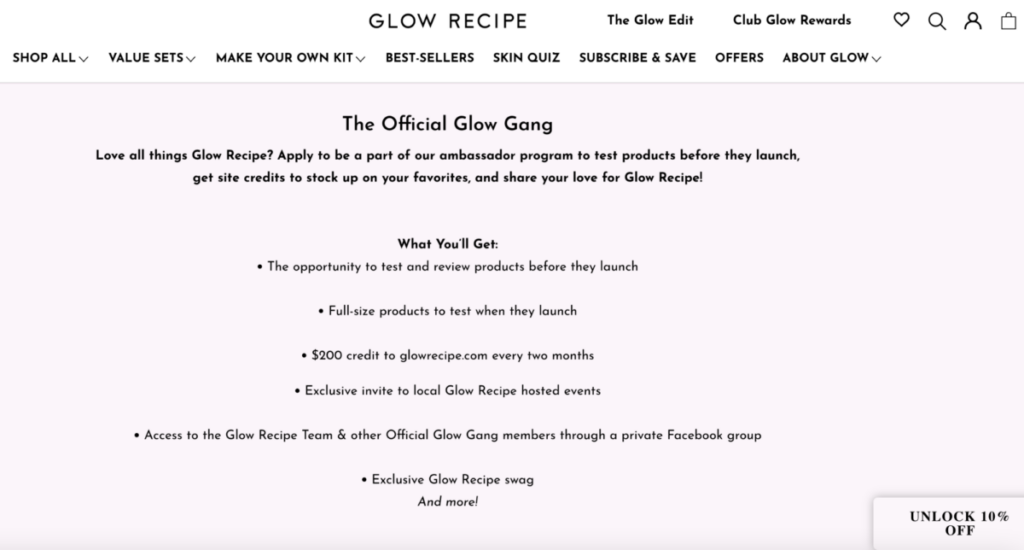
Source: glowrecipe.com
If your ambassador program involves employees, you’ll have an easier time finding ambassadors. You can easily activate your top employees or invite them through internal communications. You can even leverage employee advocacy tools to curate content for your employees to share. That way, anyone who shares the content will automatically become an ambassador.
What Are Some Brand Ambassador Strategies to Consider?
There are multiple ways that brands can work with their ambassadors. Trust us when we say that the opportunities are virtually endless. However, the following brand ambassador strategies are the most common.
Online Reviews
Brands may work with ambassadors to generate more online reviews. This may extend beyond their own website and product pages to Google listings and third-party review sites.
This is an effective method because online reviews have become vital to drive sales for most businesses. And looking at the latest online review statistics, it’s easy to understand why. In fact, 49% of consumers trust reviews as much as recommendations that they get from friends and family.
A brand’s ambassadors are the most suitable people to do reviews. They already love the product and will happily leave a positive review with little needed in the way of an incentive. Brands may choose to pay their online reviewers or send them gifts; however, they must leave the reviewers to express honest, authentic reviews. The review sites don't take kindly to anything that looks like review manipulation.
Social Media UGC
The most popular strategy is having brand ambassadors creating user-generated content on social media. This could be anything from a detailed review of the product to a simple product placement photo. Regardless of the specific approach, social media UGC helps you raise brand awareness, generate social proof, and drive more sales for your products.
In some cases, the UGC may be accompanied by a promo code that’s unique to the ambassador. Some brands may also repost UGC created by their ambassadors to add more social proof to their feed.
This is an effective way to leverage the creativity and unique voice of your brand ambassadors, which will help you freshen things up and keep your audience engaged. You can see brands like Asos regularly repurposing content from brand ambassadors showcasing unique styles to inspire buying decisions.
In-Person Events
Another popular approach is to invite brand ambassadors to in-person events. Brands would invite their top fans and creators to product launch events and events celebrating certain occasions. This creates an excellent opportunity to build your relationship with them while making them feel like a part of the brand.
Not only will this strengthen their loyalty, but you also get tons of publicity as these ambassadors share their experiences with their own followers. For instance, Huda Beauty invited several brand ambassadors comprising of influencers and advocates to their Blush Filter event promoting their latest blush product. These ambassadors created content sharing their experiences with their Instagram followers, allowing the brand to significantly amplify reach.
Modeling Opportunities
Additionally, some brands even go so far as to give their ambassadors an opportunity to model their products. This is a great way to get real people to represent your brand, which allows you to showcase how your products would look on regular individuals. So they’re far more relatable to everyday consumers than top models. Not to mention the better brand resonance since you’ll have models whose personality and aesthetic already match your brand’s.
That’s exactly why companies like Hot Topic give their brand ambassadors modeling opportunities. This is one of the main perks of becoming an HT Fanatic.
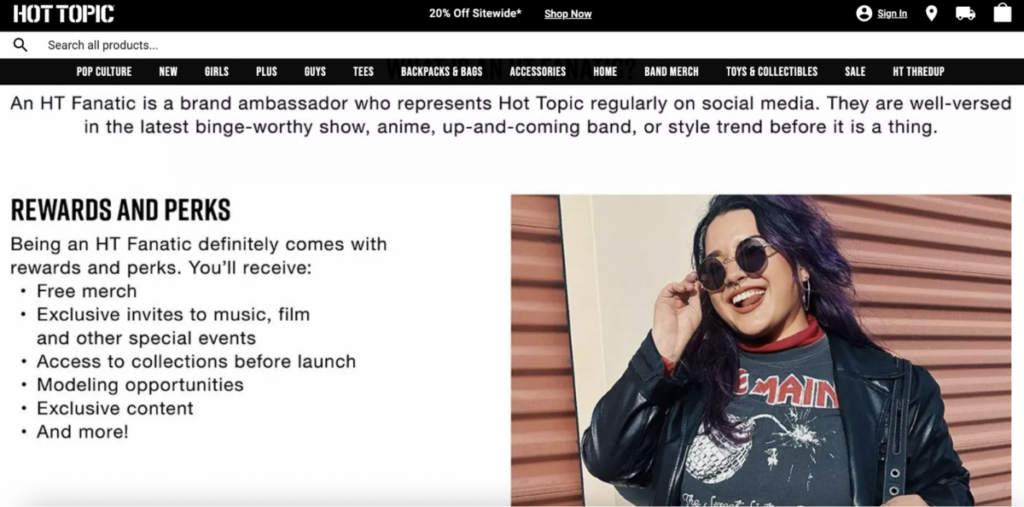
Source: hottopic.com
What Are the Different Types of Brand Ambassador Programs?
In line with the above, there are several types of ambassador programs that brands might set up. Depending on the type of program, there are different ways they might partner with their brand ambassadors.
Affiliate Marketers
There’s a formal partnership between a brand and its "affiliates," who are usually bloggers or influencers. They promote a brand in return for a commission on sales made as a result of somebody buying the product because of their promotion.
Amazon’s affiliate program is one of the biggest in the market. Their affiliates put special links on their websites, and if somebody follows through the link and buys something, Amazon pays between 1% and 10% of the money spent to the affiliate, depending on the product.
Informal Brand Ambassadors
As the name suggests, informal brand ambassadors often promote a product simply because of their love for it. They don't sign any formal contracts with the brand, and often don't receive any payment for their work. They love the product, so they choose to spread the word to their friends and family.
College Ambassadors
This is a specialist ambassador marketing scheme, where brands partner with students. A student promotes a product they like to their network of fellow students. College ambassadors sometimes operate in person, handing out product samples, putting up posters, and other more innovative techniques to promote the company’s product on campus.
Requirements-Driven Ambassadors
These brand ambassadors usually have to complete specific actions on behalf of a brand in a set time. The brand will often give free products to people who meet their requirements. It may be as simple as receiving a free download of a software product in return for making a tweet. At the other extreme, influencers who agree to make a certain number of posts on behalf of a brand are also an example of requirements-driven ambassadors.
What Are the Steps to Build a Brand Ambassador Strategy?
Building a brand ambassador strategy is pretty straightforward. The major steps include setting up your program and finding your brand ambassadors. Let’s take a look at the steps to build a brand ambassador strategy.
Step 1: Create a Brand Ambassador Program
While some brands may rely on informal relationships with fans to promote their brands, having a formal program in place is crucial. This will help you streamline your efforts to maximize the results and get more out of your brand ambassador promotions.
Start by defining the goal you want to achieve through your ambassador program. Perhaps you want to drive more sales for your products or simply raise brand awareness. You can even have multiple goals in place, but it’s important to define them so you know how to set up the program.
Based on this goal, create a brand ambassador program outlining what types of ambassadors you’re looking for, what they need to do, and what rewards they’ll get. This will guide the rest of your strategy as you’ll know what to look for in an ambassador and how to reach out to them with an appealing offer.
You can even have several types of programs in place to include both influencers and regular customers. For example, you can have one program for influencers where they get to earn a commission for the sales they help generate. You can also have a separate program for customers who can sign up for extra perks like early bird sales, exclusive access, and more in exchange for posting about your brand.
Mario Badescu has two programs in place – the regular Ambassador Program that’s open to everyone, and the Insider program that’s open to college students. Each program comes with unique perks and rewards to compensate people for promoting the brand’s products.
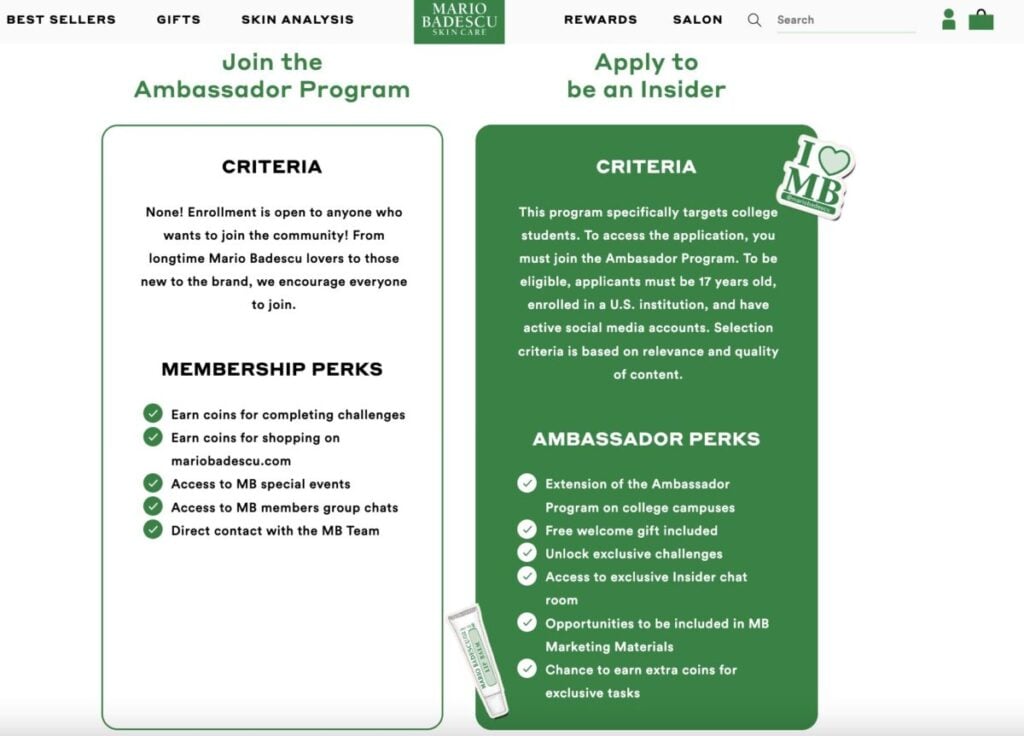
Source: mariobadescu.com
Step 2: Identify Your Brand Ambassadors
The next step is to look for the right people to become your brand ambassadors. As mentioned earlier in this guide, there are multiple ways to look for ambassadors for your brand.
This may involve using social listening tools to find people posting about your brand and leading the conversions. Or you can use influencer discovery tools and brand ambassador management platforms to conduct a search. Some platforms will even let you set up a campaign that potential brand ambassadors can apply to.
You can even have an open application process in place where people can apply to be a part of your program. This can either be an always-on program or a limited period event where you notify your customers to apply (like Glow Recipe does).
Regardless of the process, it’s important to be clear about what you’ll be looking for in a brand ambassador. Will you be working with anyone who’s a good fit for your brand image? Or do you expect them to have a certain number of followers?
For instance, Paleovalley includes the following list of requirements to become an affiliate partner. In addition to being in alignment with the brand’s products, affiliates need to have an established website with at least 5,000 email subscribers or a social media profile with at least 10,000 followers. This saves them the trouble of having to manually sort through a bunch of applications from potential affiliates who don’t match what they’re looking for.
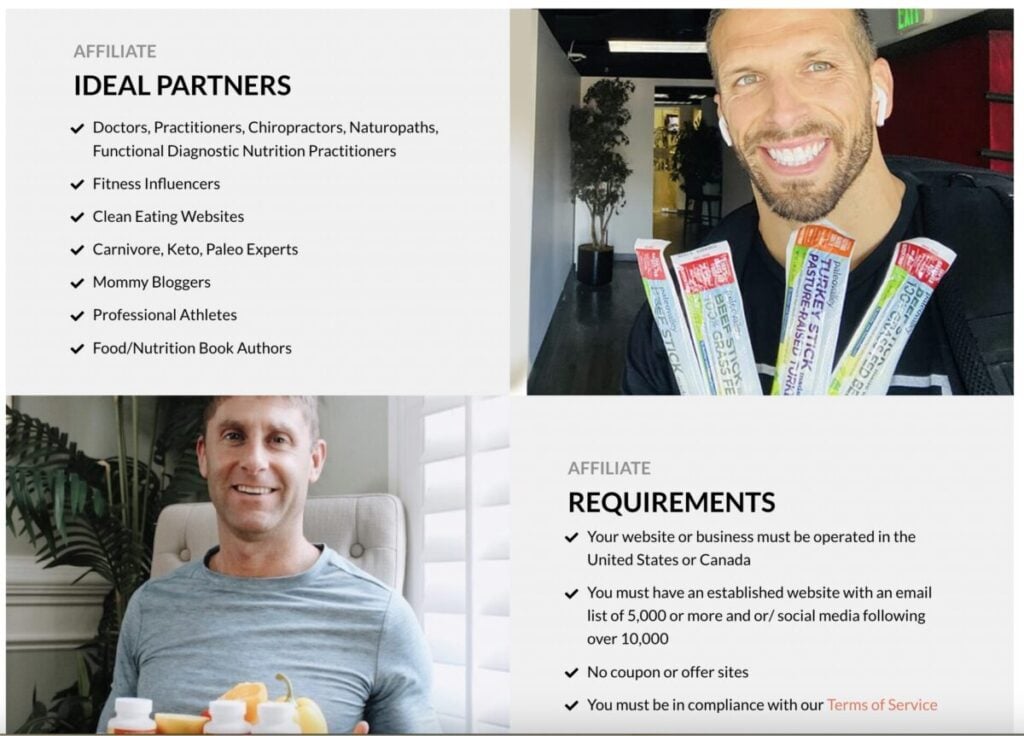
Source: paleovalley.com
Step 3: Begin Your Outreach
Once you’ve come up with a list of potential ambassadors, it’s time to reach out to them with a proposal. Note that this is only applicable if you don’t have an open application process in place. Send them a personalized message via social media or email showing your appreciation for their advocacy and sharing the details of what they’ll get from being an ambassador. Make sure to outline what they’re required to do and the next steps to take if they’re interested.
If you use a brand ambassador management tool, you could essentially automate this process. Tools like Impact.com will let you create templates that you can use to easily send personalized messages to potential ambassadors.
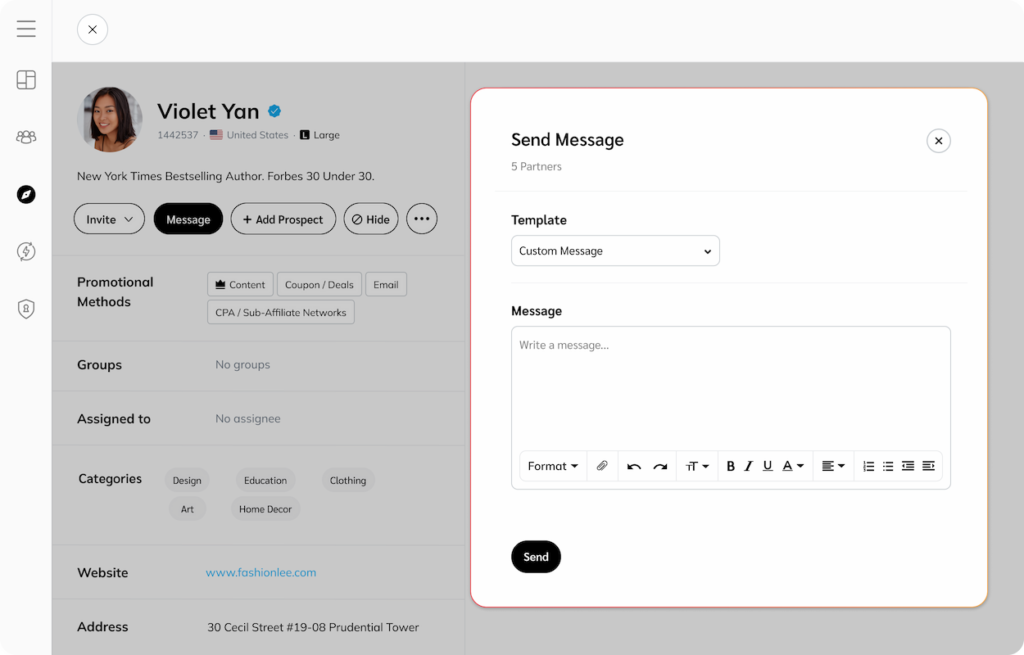
Source: impact.com
Step 4: Motivate and Empower Your Ambassadors
Even if you choose some of the best ambassadors for your brand, the success of your program depends on how well you can work with them. Make sure to motivate them with rewards and perks that are of value to them.
Additionally, empower them to effectively promote your brand. This involves providing them with all the tools and information they need to accurately represent your brand the way you expect them to. Create detailed briefs with brand guidelines and be specific with deliverables so they know what they need to do. Maintain an open line of communication so they can easily reach out to clear up any doubts.
Step 5: Measure the Impact and Optimize
Finally, once your program goes live, it’s up to you to make sure that it’s delivering positive results. How are your ambassadors following through with your requirements? Are they driving enough engagements? Are you getting any sales from their posts?
Make sure to closely track their performance to understand the difference they’re making for your brand. Monitor metrics such as reach and engagements as well as your brand’s share of voice to look for a positive trend. Keep track of conversions generated through their websites and social media posts to see if they’re driving enough sales.
Again, you can either track these metrics manually from multiple sources. Or you can simplify it using ambassador management platforms such as SocialLadder. These tools will allow you to measure the value and cost of each ambassador so you can see which ones are driving the most impact.

Source: socialladderapp.com
Based on these performance insights, you can look for ways to make improvements to your program. Whether this involves fine-tuning your choice of ambassadors or adjusting the deliverables, you’ll be able to build a much more impactful brand ambassador program.
Make Ambassador Marketing Work for You
Now that you have an in-depth understanding of what ambassador marketing is and how you can get started, it’s time to make it work for you. Understand the type of partnership you want to build and how you want to work with your brand ambassadors. Then establish a winning relationship with your brand’s biggest fans to drive more awareness and sales.
Frequently Asked Questions
What is a marketing brand ambassador?
A brand ambassador is a person employed by a business to represent its brand in a positive light. It includes anybody who you choose to represent your brand, or its associated products, services, or events. These may include influencers, but they are just as likely to be your employees or your customers.
What is ambassador job description?
A brand ambassador is paid to represent a company’s brand in a positive light. Brand ambassadors market a firm's products at the grassroots level, through "word of mouth," face-to-face or through their personal social channels. They communicate through various means, including social media, emails, messaging, and one-to-one strategies.
How do you use ambassadors?
When you start using brand ambassadors, you should work to highlight their contributions on your own platforms as well. You can identify them as experts on your products and highlight them in your blog posts, social media, and beyond.
How does an ambassador promote a business?
Ambassadors can promote a business in a number of ways, but the most popular way is social media. Although there are multiple ways that brands can choose to work with their ambassadors, we can classify most of these strategies as being online reviews, social media, or using ambassador/affiliate marketing software.
Is brand ambassador part of marketing?
A brand ambassador is a part of your company’s marketing strategy. It includes anybody who you choose to represent your brand, or its associated products, services, or events. These may include influencers, but they are just as likely to be your employees or your customers.
![Preview for What Is Ambassador Marketing? [The Complete Guide for 2024]](https://influencermarketinghub.com/imaginary/resize?width=414&type=webp&url=https://influencermarketinghub.com/wp-content/uploads/2019/09/image-10.png)


